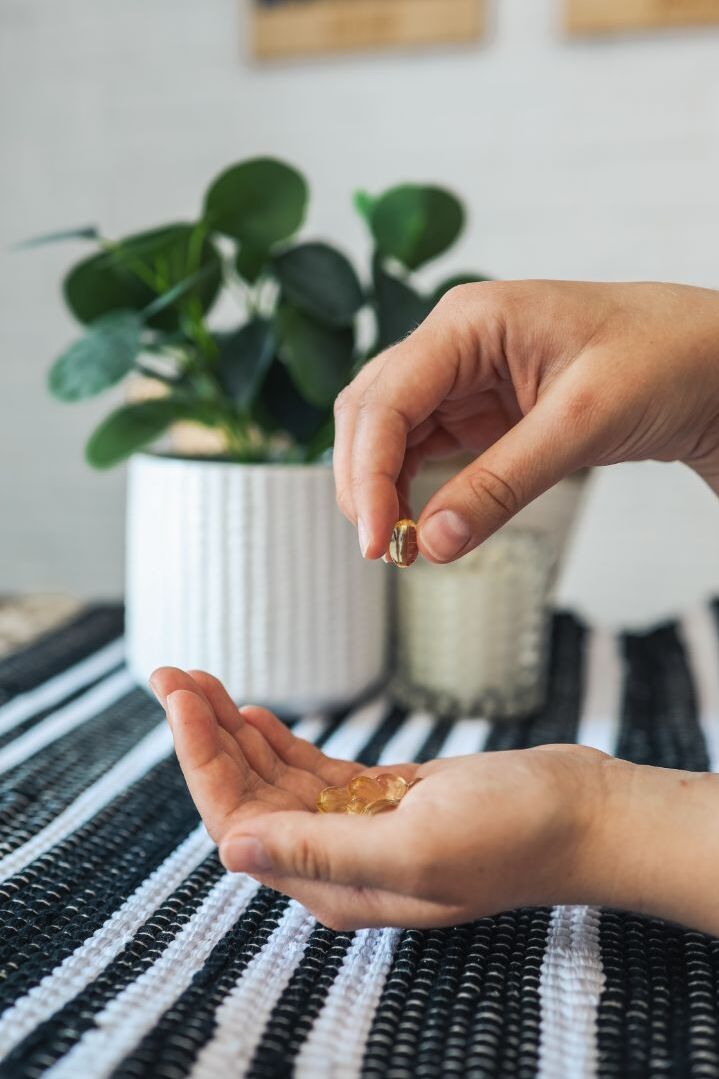

There are a lot of intriguing yet suspicious health claims floating around the internet. One claim that recently caught our eye is that biotin supplements cause acne. We wouldn't be surprised if you've seen similar claims, too.
To find out the details on biotin supplements and acne, we decided to look into this from expert opinions online and studies to learn more. Keep reading to find out whether or not biotin causes acne.
What Is Biotin?
Biotin, also known as vitamin B7, is one of the eight B vitamins. It can be found in many food sources, including meat, fish, eggs, seeds, nuts, spinach, and broccoli. Biotin helps turn food into fuel and energy. Along with other B vitamins, biotin plays an important role in keeping your hair, skin, nails, eyes, and nervous system healthy.
If biotin sounds familiar, but you can't figure out where exactly you've heard of it, there's a good chance you've seen it mentioned on the label of a hair strengthening product, where it's a common ingredient. In the body, biotin acts as a support for the protein keratin, which is found in the hair, skin, and nails. A deficiency in biotin can lead to hair thinning, hair loss, and weak and brittle nails.
Most people get plenty of biotin from food sources and do not need to take biotin supplements. Biotin deficiency is rare in the United States, but there are a few situations where someone may need to take biotin supplements. This can include people with a rare genetic disorder called biotinidase deficiency, people with alcohol dependence, and people who are pregnant and breastfeeding.
Symptoms of biotin deficiency include:
- Thinning hair
- Hair loss
- Scaly, red rash around the eyes, nose, or mouth
- Conjunctivitis
- Abnormal amounts of acid in the urine
- Skin infections
- Brittle nails
- Depression, lethargy, hallucinations, muscle stiffness, and other neurological problems
Can Biotin Cause Acne?
The short answer: Most of the time, biotin doesn't cause acne. This may go against some anecdotal reports you've seen while scrolling through social media, so here's a bit more information on why biotin usually doesn't cause any issues with acne, and also when it might.
There is no firm evidence to show that oral biotin supplements cause acne, and dermatologists generally do not prescribe or recommend it to patients as an acne treatment. But there is one situation where biotin could potentially contribute to acne. Biotin, also known as vitamin B7, and pantothenic acid, also known as vitamin B5, tend to compete with each other, and as a result can have negative effects on our bodies such as causing acne.
When vitamins B7 and B5 compete, an excess or shortage of either of these vitamins can occur. An excess of biotin results in an overproduction of skin cells and a shortage of vitamin B5, resulting in a lack of moisture in the skin. The catalyst of the two can result in acne. Still, there isn't much research to support claims that taking biotin supplements will lead to a breakout.
Do Biotin Supplements Have Any Benefits for Your Skin?
Biotin and the other B vitamins each help the body with energy production, which in turn could help produce fatty acids and other nutrients necessary for healthy skin, nails, and hair. But an important point to understand is that most people in the United States get enough biotin through dietary sources and do not need to take supplements. The research suggesting that extra biotin could have skin benefits are more testimonials.
The National Institute of Health's Office of Dietary Supplements (ODS) further strengthens this point, stating that there is little scientific evidence to support claims that biotin supplements improve hair, skin, and nail health. There are some reports of biotin improving skin rashes in infants and a rare hair disorder in children, but additional research is needed before recommending biotin supplements for any of these conditions, according to ODS.
How Much Biotin Should You Take?
Most people are able to get plenty of biotin from their diet and don’t need to take a supplement. In fact, biotin deficiency is so rare that there isn't a recommended daily allowance (RDA) for it, as there is for many other nutrients. That said, the normal recommended intake for biotin—which, again, can almost always be achieved through diet—is between 30 and 100 micrograms per day.
It would be very rare for a dermatologist to suggest taking biotin to treat acne, but they might suggest taking biotin to improve issues with hair strength or hair loss. People who experience symptoms of hair thinning and hair loss could potentially benefit from adding a biotin supplement to their daily regimen. In order to reap the benefits of biotin for hair, skin, and nails, an additional 2 to 5 mg of biotin is recommended. But be sure to speak to your doctor before rushing out to buy any biotin supplements. Your doctor can help determine if you should take biotin supplements and how much you need to take.
The Final Takeaway
Beyond anecdotal reports, there isn't any evidence or research to show that biotin causes acne. But there's plenty of research showing that B vitamins are very important for maintaining skin, eye, and nail health. Most people get plenty of biotin through dietary sources alone, but dermatologists may sometimes recommend a small dosage of biotin supplements to improve hair or nail strength.
Be sure to speak with your doctor before taking any biotin supplements. The amount of biotin recommended for each individual—if recommended at all—will vary on a case-by-case basis. Depending on factors such as your age, sex, diet, and medical history, your doctor will determine the amount of additional biotin you should take.
Still Need Help With Acne?
Check out Wild Naturals skin care line for natural products to help reduce inflammation, redness, oily skin, and all forms of acne!


